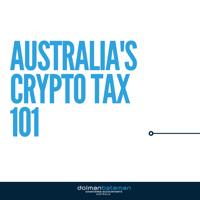PAYG (Pay As You Go) instalments are prepayments of tax made by businesses and individuals to the...
ATO's Consecutive Increase In General Interest Rates Spells Trouble for Late Tax Payments
.png?width=1080&height=1080&name=DolmanBateman-ATOs-Consecutive-Increase%20(1).png) It looks like there's been some big news shaking up Australia's financial scene!
It looks like there's been some big news shaking up Australia's financial scene!
The Australian Taxation Office (ATO) has seen interest charges jump up to levels we haven't seen since the Global Financial Crisis (GFC).
It's got a lot of people, both individuals and businesses, wondering what this means for their financial health.
Right now, you might be feeling unsure about how this might impact you, but don’t worry, you are not alone. We’re here to help guide you through changes like these.
Understanding the General and Shortfall Interest Charges
Before we delve into the implications of these rate increases, let's understand what the GIC and SIC are.
General Interest Charge (GIC): The GIC is applied to late payments of various taxes, including income tax, Fringe Benefits Tax (FBT), Goods and Services Tax (GST), and Pay As You Go (PAYG) withholding tax. Additionally, it is imposed on excessive shortfalls resulting from incorrectly varied or estimated tax instalments. The GIC is calculated daily and is based on the Reserve Bank of Australia's (RBA) 90-day Bank Accepted Bill rate plus 7 percent.
Shortfall Interest Charge (SIC): The SIC applies to amended income tax assessments made prior to the period of amendment. It is also calculated on a daily compounding basis, using the 90-day Bank Accepted Bill rate plus 3 percent. Generally, the SIC begins accruing from the due date for payment of the understated assessment until the day before the ATO issues the notice of amended assessment. Taxpayers are required to settle the amended assessment and related SIC within 24 days after the amended assessment is issued.
The Unprecedented Rate Increases
The recent announcement by the ATO marks a significant departure from previous trends. Both the GIC and SIC rates have seen a consistent 0.25 percent increase for eight consecutive quarters. The GIC's annual rate now stands at 11.15 percent, while the SIC rate has reached 7.15 percent. The last time either rate was higher was during the second quarter of 2012, during the fallout of the GFC.
Impact on Taxpayers
For Australian taxpayers, the implications of these rising rates are far-reaching. Late tax payments and amended assessments will now incur significantly higher interest charges. It is crucial for individuals and businesses to be aware of these changes and take appropriate measures to avoid accumulating substantial interest costs.
Additionally, the compounding nature of these charges means that they can grow rapidly if left unaddressed. Taxpayers should prioritise timely and accurate tax payments to mitigate the impact of the GIC and SIC on their financial well-being.
Seeking Relief: Remission of GIC
While the ATO's decision to increase interest rates is unwelcome news for taxpayers, there is a silver lining. Taxpayers can apply for remission of the GIC in part or in full under certain circumstances. The ATO may consider remission if:
The delay in payment was not due to the taxpayer, for reasons such as natural disasters, industrial action, the unforeseen collapse of a major debtor, or the sudden ill health of key personnel. In such cases, the taxpayer must have taken reasonable action to minimise the delay.
The delay in payment was due to the taxpayer, but they took reasonable action to reduce the delay, and it is fair and reasonable to remit the GIC.
Payment of the full amount of GIC would result in serious financial hardship for the taxpayer.
Stay Informed and Act Responsibly
In this environment of steadily rising tax interest rates, it is imperative for taxpayers to stay informed about their tax obligations and make every effort to meet them promptly. Seeking professional advice and exploring remission options when facing financial challenges can help alleviate the burden of these charges.
The ATO's decision to increase the GIC and SIC rates for the eighth consecutive quarter serves as a stark reminder of the importance of responsible tax management. By staying proactive and informed, individuals and businesses can navigate this challenging landscape and avoid unnecessary financial strain.
The ATO's recent decision to hike up the GIC and SIC rates for the eighth time in a row is definitely a wake-up call for all of us about the importance of staying on top of our tax management. But don't worry, you don't have to navigate this complex landscape alone!
Feeling a bit overwhelmed or unsure about what this means for you? We're here to help!
Give us a call at 02 9411 5422, and let's work together to make sure you're taking the right steps to manage your taxes responsibly and avoid any unnecessary financial stress.
Don't wait, reach out to us today!



